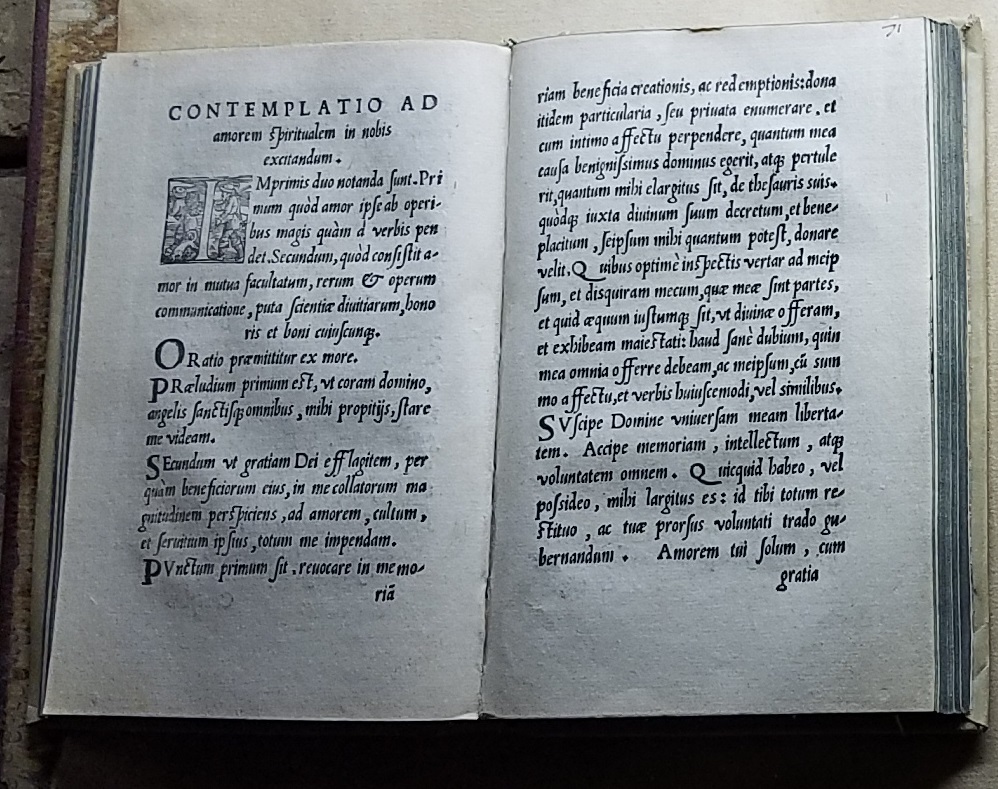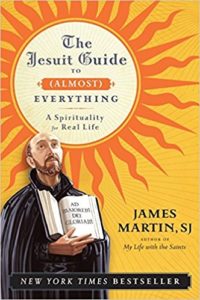
Ignatian Spirituality is a vehicle for loving and serving God. Much of this spirituality is born out of his experience after injuring his leg in battle. Having abandoned his quest to become a valiant knight, Ignatius sought to devote himself wholeheartedly to Jesus. During his convalescence and for the next several years, Ignatius devised a series of “spiritual exercises” to train the soul to be more in tune with God’s will and develop a more personal relationship with Christ. (The image above is from the first printed edition of the Spiritual Exercises, now housed in the Jesuit curia in Rome.)
The Spiritual Exercises represent the culmination of Ignatius’s spiritual journey. All Jesuits undergo these Spiritual Exercises in the form of a month-long retreat at least twice in their lifetime, but the spirituality from these Exercises extends beyond the retreat-house to encompass every aspect of a person’s understanding of God and the world.
The sections below outline the key elements of Ignatian Spirituality as drawn from the Spiritual Exercises. Some of these focus on ordinary things that we encounter every day, while others help us discern where our lives are headed. Regardless of the object of our contemplation, all of these elements are essential to Ignatian Spirituality, and all require regular practice.
Beginner
OVERVIEW
Several books provide an overview of Ignatian Spirituality for laypeople. A concise introduction is Gerald M. Fagin’s Discovering Your Dream: How Ignatian Spirituality Can Guide Your Life (Loyola Press, 2013). This 115-page book is a compendium of lectures delivered to undergraduate students at Loyola University in New Orleans. Fagin offers a short biography of Ignatius (chaps. 1-2), an overview of the Exercises and key elements (chaps. 3-7), and tips for discernment (chaps. 8-10).
For a more thorough introduction, see Jim Martin’s A Jesuit Guide to (Almost) Everything. Arguably the best resource for all things Jesuit, it’s a bit lengthy at 448 pages. For the essential parts, look at the following sections:
Pp. 5-11 – Finding God in all things, contemplative in action, freedom and detachment
Pp. 11-19 – Biography of Ignatius
Pp. 19-21 –  Overview of Spiritual Exercises
Overview of Spiritual Exercises
Pp. 57-85 – Desire
Pp. 86-102 – The Examen
(Chaps. 5-6 on Prayer are also recommended.)
Pp. 143-173 (*especially 145-152) – Types of Prayer: Ignatian contemplation, Lectio Divina, and others
Pp. 234-236 – Presupposition of Charity
Pp. 305-338 (*especially 306-332) – Discernment
PRESUPPOSITION OF CHARITY & FIRST PRINCIPLE AND FOUNDATION
Ignatius begins the Spiritual Exercises with two preliminary points. The first is the Presupposition of Charity, whereby a person assumes the best intentions behind another person’s statements.
The second point is known as the First Principle and Foundation. Ignatius emphasizes that in everything we do, we must serve, praise, and revere God. This priority on God should also lead to indifference about everything else. Click here for the text of the First Principle and Foundation, and see a very brief commentary here. See also a short description of the related concept Ad Maiorem Dei Gloriam (AMDG), which means, “For the greater glory of God.”
EXAMEN
Ignatius encouraged people to reflect on their lives everyday, identifying where they experienced God’s grace and where they fell short of living up to God’s call. For a summary of this type of prayer, see this 4-minute video by the Jesuits of South Africa.
DISCERNMENT
Essential to Jesuit spirituality is the practice of discerning between the good desire that come from God and the bad desires that come from the evil spirit. For an explanation of Ignatian discernment, read Gerald M. Fagin, Discovering Your Dream: How Ignatian Spirituality Can Guide Your Life, pp. 92-107. For a shorter introduction, see Mark Thibodeaux, God’s Voice Within, pp. 9-13.
FINDING GOD IN ALL THINGS
Ignatius encouraged people to find God everywhere in life, not only in the good things but even in the most obscure places. For an example of doing so amidst the busy pace of city life, see an article by Bill Blazek, SJ, in an August 2007 issue of the Washington Post entitled “Finding God on the Metro.”
CONTEMPLATIVE IN ACTION
A closely related concept is being a contemplative in action, striving for a prayerful and reflective life while also working in the world to make it a better place.
IGNATIAN CONTEMPLATION
Scripture permeates so much of Ignatius’s writings, and he wanted people to engage their imagination fully as they read the bible, utilizing all five senses in the process. See the video below for an introduction to this method of reading Scripture.
IGNATIAN PRAYERS & REFLECTIONS
For the text of common Jesuit prayers such as the Suscipe (“Take, Lord, receive…”) and the Prayer of Generosity (“Lord, teach me to be generous…”), click here. There are numerous resources for daily reflections, such as those found at Xavier University, Creighton University, and the Magis Spirituality Center. See also the daily reflections on Scripture at JesuitPrayer.org, Pray as you Go, and Sacred Space. For quick 3-minute “retreats,” see Loyola Press’s website, and for longer retreat talks, visit Creighton’s webpage.
EXPERIENCES OF THE SPIRITUAL EXERCISES
Besides learning about Jesuit spirituality, it’s also important to live it. Newcomers to this type of praying and looking at the world should try to incorporate the examen and other spiritual components into their daily lives. They should also seek out opportunities for experiences of the Spiritual Exercises, especially ones provided by their institution or by a local Jesuit Spirituality center. Some schools host Ignatian Evenings for faculty/staff, which are a great way to break bread with colleagues, pray together, and grow in Ignatian spirituality. Multiple schools also come together every year for the New Ignatian Educators Retreat for newer faculty, which allows them to delve more deeply into the Spiritual Exercises. After completing this retreat, faculty/staff should also seek out a condensed version of the Exercises in an annual 3-day or 8-day retreat about once a year.
Intermediate
People already familiar with the basic components of Ignatian spirituality might want to probe more deeply into these same concepts. The recommended readings below are drawn from scholars of Jesuit spirituality or from the letters of Ignatius Loyola.
MAGIS
Latin for “more,” this concept is often confused with being more productive and doing more rather than on the quality and effects of one’s actions. See the thought-provoking article by Bart Geger: “What Magis Really Means and Why It Matters,” Jesuit Higher Education 1:2 (2012): 16-31.
See also Ignatius’s letter to Teresa Rejadell in 1532 (Letter no. 8; Spanish text no. 1.107-109) where he counsels her not to overextend herself but to attend to her physical health as well.
FIRST PRINCIPLE AND FOUNDATION
For Ignatius’s views on poverty and freedom from material things, see his letter (probably written by his assistant Juan Alfonso de Polanco) to Jesuits in Padua on the subject of poverty (Letter no. 186; Italian text no. 1.572-577).
EXAMEN
For a more in-depth look at the Examen, see this three-part article from the July/Aug 2021 issue of The Word Among Us by Fr. Nathan O’Halloran, SJ.
EXPERIENCES OF THE SPIRITUAL EXERCISES
People who have been in their institution for 3 or more years should continue to explore opportunities to experience the Spiritual Exercises, especially as listed in the “Beginner” section above. They might also join a faith-sharing group or team up with a prayer partner at their school, and if there school has one, they should definitely consider taking part in an 18th or 19th Annotated Retreat.
Advanced
Following the example of St. Ignatius, consider writing your spiritual autobiography. Perhaps meet with a Jesuit or spiritual director to discuss the significance of this intensely introspective experience.
Instructions: Take some time in prayer and reflection to consider your spiritual growth and development through the years, paying special attention to the peaks and the valleys. Then write a “spiritual autobiography” that relates your life story in general and, specifically, recounts the influences, events, movements that helped shape who you are today, especially as they pertain to your vocational and faith journey. It can be as long and detailed as you want, but aim for at least 15 double-spaced pages.
Among the questions you might consider are:
- What were your early years like? What was it like growing up in your family?
- Who have been the significant people in your life?
- What has been your experience of school? Of work?
- What are the significant turning points in your life?
- What are some significant decisions you have made?
- What are have been your struggles and conflicts?
- What are your principal strengths and weaknesses? Your successes and failures?
- How have you found God in your life? How has your relationship with God developed over the years?
- What has been your experience of prayer, of Church and of the sacraments?
EXPERIENCES OF THE SPIRITUAL EXERCISES
Veteran faculty and staff should consider going on a 3-day or 8-day retreat, especially the summer Colleagues Retreat if their province has one. They might also consider taking part in the full 30-day retreat or participating in an Ignatian Pilgrimage to holy sites in western Europe. Several such programs exist, both at the province level and at the national level.
